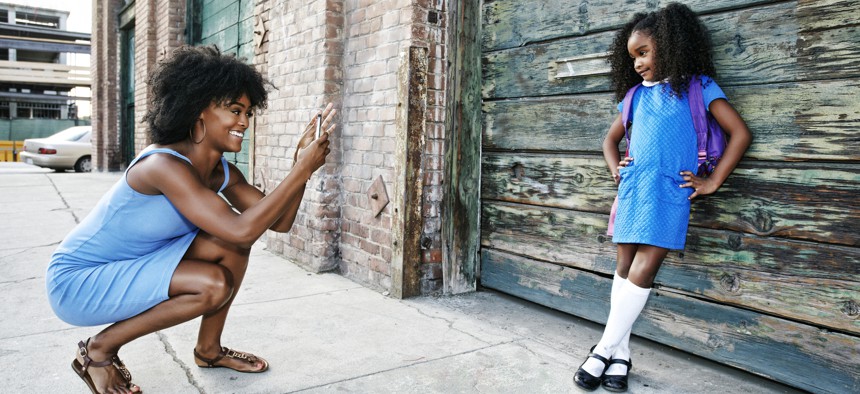New ‘kidfluencer’ law allows child social media stars to sue parents

Peathgee Inc/Getty Images
Illinois became the first in the nation to require parents to set aside kids’ gross earnings in a trust. If they don’t, children can sue.
Young social media influencers often grow up in full glare of the cameras, with their every move filmed and posted on platforms like Instagram, TikTok and YouTube by their parents.
And there are indications that such content is incredibly lucrative. A CBS News documentary in 2019 found that so-called “kidfluencers” could earn upwards of $10,000 for each sponsored post.
But unlike child actors, a portion of whose earnings from movies and television shows are protected in a trust fund in California under the so-called Coogan Law to avoid their parents or guardians frittering it away, similar protections do not exist for child social media stars. And due to platforms’ age restrictions, content is created in the parent or guardian’s name, not the child’s.
Illinois has become the first state to change that, however. Gov. J.B. Pritzker signed legislation into law earlier this month that amends the state’s child labor law to ensure influencers and social media stars under 16 will be entitled to a percentage of the earnings they receive.
Under the legislation, parents or guardians are required to set aside their kids’ gross earnings in a trust that the child can access when they turn 18. It also opens a path for kids to sue parents who keep the money for themselves.
The law applies to videos filmed in the state, and minors would have to be featured in at least 30% of the content in a 30-day period. That percentage is measured by the amount of time their likeness, name or photograph appears or is the subject of audio narration.
Illinois Sen. Dave Koehler said the lack of protections for child social media stars means parents have “taken this opportunity to pocket the money” their kids earn, while they continue to work online and rake in massive profits.
“This new digital age has given us tremendous opportunities to connect with one another, but it’s also presented legal issues that have never existed before,” Koehler said in a statement. “We need to work with our children to see the problems they face and tackle them head-on before any further harm is done.”
Koehler said he got the idea for the legislation, which passed both chambers of the state legislature in May, from 15-year-old constituent Shreya Nallamothu, who raised concerns that money made by child influencers was not being protected for them from parents or guardians. In a statement released by Koehler’s office, Nallamothu said she wanted “to protect the money that these kids have rightfully earned.”
Kidfluencer content has become big business, as social media influencing as a whole is now estimated to be worth more than $21 billion. The CBS News report found that some child social media stars have millions of followers across various platforms, with some families earning hundreds of thousands of dollars a month through advertising revenue and deals with brands. The 11-year-old kidfluencer Ryan Kaji, for instance, earned $27 million in 2021, and Nastya, a eight-year-old Russian toy unboxer, earned $28 million.
A couple states have looked to stay ahead of parents and guardians exploiting their children’s income on social media. California amended its child labor laws several years ago to include minors who are social media performers. And Washington has legislation similar to that of Illinois under consideration. It stalled in committee this year, but the bill is expected to be reintroduced in December.
The legislation in Washington would go a step further than the Illinois law, assuming there are no changes to the current version. It contains a provision allowing child influencers to request permanent deletion of content once they have reached the age of 18. Illinois’ law had a similar requirement, but it was stripped out of the final bill.
The Illinois law goes into effect on July 1 next year.






